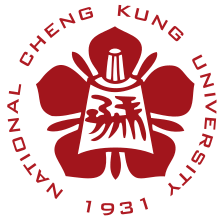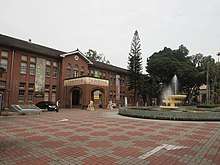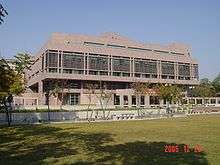National Cheng Kung University
|
國立成功大學 | |
 | |
| Motto | 窮理致知[1] |
|---|---|
Motto in English | Discover the truth, devoted to knowledge. |
| Type | Public (National) |
| Established | 1931 |
| President | Huey-Jen Jenny Su |
Academic staff | 1423[2] |
| Undergraduates | 11,840 |
| Postgraduates | 10,392 |
| Location | Tainan, Taiwan |
| Campus | Main campus in urban Tainan and satellite campuses in rural Tainan areas. |
| Colors |
Red, Gray and White [3] |
| Affiliations | Global research & industry alliance(Gloria) of Ministry of Science and Technology of the Republic of China[4], Worldwide Universities Network, Taiwan Comprehensive University System, AACSB, Institute of Engineering Education Taiwan |
| Website | English, Chinese |
| National Cheng Kung University | |||||||||||||||||
| Traditional Chinese | 國立成功大學 | ||||||||||||||||
|---|---|---|---|---|---|---|---|---|---|---|---|---|---|---|---|---|---|
| Simplified Chinese | 国立成功大学 | ||||||||||||||||
| |||||||||||||||||
National Cheng Kung University (NCKU; Chinese: 國立成功大學; pinyin: Guólì Chénggōng Dàxué)[note 1] is a research-led comprehensive university in Tainan, Taiwan. NCKU is one of the four internationally top ranked universities in Taiwan and one of the top ranked universities in Asia, it comprises 9 colleges, 43 departments, and 39 institutes. The university is best known for its engineering, computer science, medicine, and planning and design. NCKU is the sole member from Taiwan in Worldwide Universities Network[5].
In 2005, NCKU was chosen by the Ministry of Education (Taiwan) as one of the seven universities in Taiwan for the Aim for the Top University Project (邁向頂尖大學計畫), which is similar to Top Global University Project in Japan and Universities of Excellence in Germany. Starting from 2006, because of its excellent academic performance and research potential, the Ministry of Education (Taiwan) has offered NCKU NT$1.7 billion annually for five consecutive years, which is the second highest amount received among the universities in the project.[6]

NCKU is a founding member of Taiwan Comprehensive University System, a strategic alliance of four leading research universities in the southern part of Taiwan. The university is also a member of AACSB and IEET.
History
National Cheng Kung University was originally established under Japanese government in January 1931 as the Tainan Technical College. After the Japanese handover of Taiwan, the school was renamed to Taiwan Provincial Tainan Junior College of Technology in March 1946, and then to Taiwan Provincial College of Engineering in October the same year.
When the government of the Republic of China moved to Taiwan in 1949, it was one of the three existing colleges in Taiwan. As the number of colleges expanded, it was upgraded to a provincial university in 1956 as Taiwan Provincial Cheng Kung University, named after Koxinga, a Chinese military leader who drove the Dutch East India Company from Taiwan and founded the Kingdom of Tungning. In 1971, the university became a national university and was renamed to National Cheng Kung University.
Former Minister for Education Wu Jin served as the first president of the new National Cheng Kung University.[7]
Campuses
NCKU has 11 campuses: An-Nan, Cheng-Kung, Cheng-Xin, Ching-Yeh, Dong Ning, Dou-Liou, Kuang-Fu, Kuei-Jen, Li-Hsing, Sheng-Li and Tzu-Chiang.

On January 12, 2011, the Y. S. Sun Green Building Research Center was inaugurated.[8] It is the world's first green educational center as well as Taiwan's first zero carbon building.[9] The 4,800 m2 (52,000 sq ft)-facility cost NT$30 million (US$4.41 million) to construct, far below the original NT$180 million budget.[8] Natural ventilation, limited power usage, reduced window size, and energy efficient lighting all contribute to the building's carbon neutrality.[8]
Organization and Academics
Academics at NCKU is organized into 9 colleges, each with its own faculties, departments, and institutes offering programs up to doctoral level. While most courses are taught in Mandarine Chinese, many are offered in English.
International programs
NCKU participates in the Taiwan International Graduate Program in Interdisciplinary Neuroscience of Academia Sinica, Taiwan's most preeminent academic research institution.
Rankings
| University rankings | |
|---|---|
| Global | |
| ARWU World[10] | 201-300 |
| Leiden World[11] | 130 |
| Times World[12] | 301-350 |
| QS World[13] | 222 |
| Regional | |
| Times Asia[14] | 47 |
| QS Asia[15] | 35 |
NCKU is generally considered to be a top tier university in Taiwan, along with National Taiwan University, National Tsing Hua University, and National Chiao Tung University. As of 2018, the QS World University Rankings ranked NCKU 222th overall in the world, 35th in Asia, and 4th in the nation.
According to QS World University Rankings by Subject in 2017 [16], the NCKU ranked within the world's top 100 universities in the following fields: Electrical and Electronic Engineering, Civil and Structural Engineering, Mechanical Engineering, and Engineering and Technology. It also ranks within the top 150 for the following programs: Computer Science and Information System, Education and Training, Materials Sciences, Architecture, Statistics and Operational Research, Art and Design, Environmental Studies, Chemical Engineering, and Social Science and Management.
Furthermore, according to the Academic Ranking of World Universities, NCKU ranked 37th in the engineering field and 52nd in computer science in 2009. [17]
Finally, according to the ESI database, NCKU has published 18,333 papers in the last ten years and has respectively ranked the 24th and the 51st in the list of world top 100 universities respectively in the engineering and computer science fields.
List of Presidents
- Wakatsuki Michitaka (January 1931 – August 1941)
- Sakuma Iwao; 佐久間巖 (August 1941 – March 1944)
- Shunsuke Suemitsu; 末光俊介 (March 1944 – October 1944)
- Saburo Kousuke; 甲婓三郎 (October 1944 – October 1945)
- Wang Shih-an (February 1946 – August 1951)
- Yeh Tung-tse (August 1951 – February 1952)
- Qing Dajun (February 1952 – July 1957)
- Yen Cheng-hsing (August 1957 – December 1964)
- Lo Yun-ping (January 1965 – July 1971)
- Ni Chao (August 1971 – July 1978)
- Wang Wei-nung (August 1978 – July 1980)
- Hsia Han-min; 夏漢民 (August 1980 – July 1988)
- Ma Che-ju; 馬哲儒 (August 1988 – July 1994)
- Wu Jin (August 1994 – June 1996)
- Huang Ting-chia; 黃定加 (July 1996 – February 1997)
- Weng Chen-yi; 翁政義 (February 1997 – May 2000)
- Weng Hung-shan; 翁鴻山 (May 2000 – January 2001)
- Kao Chiang; 高強 (February 2001 – January 2007)
- Michael Lai (February 2007 – January 2011)
- Hwung-Hweng Hwung (February 2011 – January 2015)
- Sung Hui-chen; 蘇慧貞 (since February 2015)
Notable alumni
- Chang Chia-juch, Minister of Economic Affairs (2013–2014)
- Chen Hsiung-wen, Minister of Labor (2014–2016)
- Tze-Chiang Chen, IBM Fellow, Vice President of Science and Technology at Thomas J. Watson Research Center, IBM Research Division
- Cheng Nan-jung majored in engineering at NCKU for one year before changing his interest to humanities
- Ken P. Chong, Director of the Division of Mechanics and Materials at the U.S. National Science Foundation
- Chu Ching-wu, Superconductor Physicist, President of Taiwan Comprehensive University System
- Wei-Kan Chu (1962), professor of physics, University of Houston
- Fan Chih-ku, Administrative Deputy Minister of Transportation and Communications
- Hsu Hsin-ying, founder and Chairperson of Minkuotang
- C. Y. Lee directed the design of Taipei 101, the world's second tallest, fully inhabited skyscraper
- Wen Ho Lee, nuclear physicist accused of spying for the PRC against the United States
- Lee Wo-shih, Magistrate of Kinmen County (2009–2014)
- Lin Hsin-i, Chairman of the Industrial Technology Research Institute, President of China Motor Corporation
- Lin Yi-bing, Vice President of the Office of Research and Development at the National Chiao Tung University
- Chung Laung Liu, computer scientist
- Lung Ying-tai, Minister of Culture (2012–2014)
- Mao Chi-kuo, Premier of the Republic of China (2014–2016)
- Pai Hsien-yung majored in engineering at NCKU for one year before changing his interest to humanities
- Samuel C. C. Ting, Nobel Prize laureate, attended NCKU prior to moving back to the United States
- Wang Chien-shien, President of Control Yuan (2008–2014)
- Wu Po-hsiung, Mayor of Taipei (1988–1990) and Chairman of Kuomintang (2007–2009)
- Chen Liang-gee, Minister of Ministry of Science and Technology (Taiwan) (2016-Present) and Distinguished Professor, Department of Electrical Engineering, National Taiwan University
See also
Notes
- ↑ The name of the university is translated using Chinese word order. By English grammar rules, it is Cheng Kung National University.
References
- ↑ "校務基本資料 (School Profile)". National Cheng Kung University. Retrieved 2014-06-20.
- ↑ "NCKU: Facts 2012".
- ↑ "NCKU: Colors".
- ↑ https://www.most.gov.tw/folksonomy/detail?subSite=&l=ch&article_uid=f1bd55f0-94ac-4d23-83d1-2030823d5331&menu_id=9aa56881-8df0-4eb6-a5a7-32a2f72826ff&content_type=P&view_mode=listView
- ↑ https://wun.ac.uk/wun/members/view/NCKU
- ↑ Mao, Huan-wen (2005-06-09). "Universities get opportunity to excel". Taipei Times. Retrieved 2008-03-21.
- ↑ "Former Education Minister Wu Jin dies at 74". China Post. 2008-01-16. Retrieved 2008-01-21.
- 1 2 3 "Quirky but efficient, Taiwan's first carbon neutral building opens". Focus Taiwan News Channel. 2011-01-13. Retrieved 2011-01-13.
- ↑ Grace Kuo (2011-01-07). "NCKU completes Taiwan's first zero-carbon building". Taiwan Today. Retrieved 2011-01-08.
- ↑ Academic Ranking of World Universities 2014
- ↑ CWTS Leiden Ranking 2017
- ↑ Times World University Ranking 2014
- ↑ QS World University Ranking 2018
- ↑ Times Asia University Ranking 2017
- ↑ QS Asia University Ranking 2018
- ↑
- ↑ http://www.shanghairanking.com/World-University-Rankings/National-Cheng-Kung-University.html. Missing or empty
|title=(help)
External links
| Wikimedia Commons has media related to National Cheng Kung University. |
- Official website (in English and Traditional Chinese)
- NCKU Office of International Affair
- NCKU's masters & PhD English international-business program website
- Spring Semester 2009: Application Instructions for International Degree Students
- Office of International Affairs, NCKU
- Three universities in central and southern Taiwan forge alliance